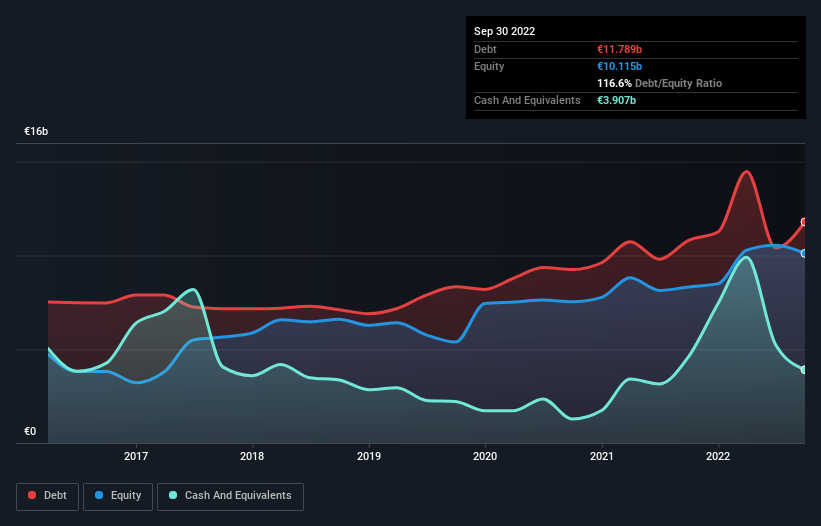- Germany
- /
- Electric Utilities
- /
- XTRA:EBK
Here's Why EnBW Energie Baden-Württemberg (ETR:EBK) Can Manage Its Debt Responsibly

Warren Buffett famously said, 'Volatility is far from synonymous with risk.' It's only natural to consider a company's balance sheet when you examine how risky it is, since debt is often involved when a business collapses. We can see that EnBW Energie Baden-Württemberg AG (ETR:EBK) does use debt in its business. But is this debt a concern to shareholders?
When Is Debt Dangerous?
Debt is a tool to help businesses grow, but if a business is incapable of paying off its lenders, then it exists at their mercy. Part and parcel of capitalism is the process of 'creative destruction' where failed businesses are mercilessly liquidated by their bankers. However, a more usual (but still expensive) situation is where a company must dilute shareholders at a cheap share price simply to get debt under control. Of course, debt can be an important tool in businesses, particularly capital heavy businesses. The first step when considering a company's debt levels is to consider its cash and debt together.
See our latest analysis for EnBW Energie Baden-Württemberg
What Is EnBW Energie Baden-Württemberg's Net Debt?
You can click the graphic below for the historical numbers, but it shows that as of September 2022 EnBW Energie Baden-Württemberg had €11.8b of debt, an increase on €10.8b, over one year. On the flip side, it has €3.91b in cash leading to net debt of about €7.88b.

How Healthy Is EnBW Energie Baden-Württemberg's Balance Sheet?
According to the last reported balance sheet, EnBW Energie Baden-Württemberg had liabilities of €45.3b due within 12 months, and liabilities of €32.8b due beyond 12 months. Offsetting this, it had €3.91b in cash and €6.79b in receivables that were due within 12 months. So its liabilities total €67.4b more than the combination of its cash and short-term receivables.
This deficit casts a shadow over the €23.8b company, like a colossus towering over mere mortals. So we definitely think shareholders need to watch this one closely. At the end of the day, EnBW Energie Baden-Württemberg would probably need a major re-capitalization if its creditors were to demand repayment.
In order to size up a company's debt relative to its earnings, we calculate its net debt divided by its earnings before interest, tax, depreciation, and amortization (EBITDA) and its earnings before interest and tax (EBIT) divided by its interest expense (its interest cover). This way, we consider both the absolute quantum of the debt, as well as the interest rates paid on it.
EnBW Energie Baden-Württemberg's net debt is 3.3 times its EBITDA, which is a significant but still reasonable amount of leverage. However, its interest coverage of 32.2 is very high, suggesting that the interest expense on the debt is currently quite low. Pleasingly, EnBW Energie Baden-Württemberg is growing its EBIT faster than former Australian PM Bob Hawke downs a yard glass, boasting a 5,468% gain in the last twelve months. There's no doubt that we learn most about debt from the balance sheet. But you can't view debt in total isolation; since EnBW Energie Baden-Württemberg will need earnings to service that debt. So when considering debt, it's definitely worth looking at the earnings trend. Click here for an interactive snapshot.
Finally, a company can only pay off debt with cold hard cash, not accounting profits. So the logical step is to look at the proportion of that EBIT that is matched by actual free cash flow. Over the most recent three years, EnBW Energie Baden-Württemberg recorded free cash flow worth 65% of its EBIT, which is around normal, given free cash flow excludes interest and tax. This free cash flow puts the company in a good position to pay down debt, when appropriate.
Our View
Based on what we've seen EnBW Energie Baden-Württemberg is not finding it easy, given its level of total liabilities, but the other factors we considered give us cause to be optimistic. In particular, we are dazzled with its interest cover. We would also note that Electric Utilities industry companies like EnBW Energie Baden-Württemberg commonly do use debt without problems. When we consider all the factors mentioned above, we do feel a bit cautious about EnBW Energie Baden-Württemberg's use of debt. While we appreciate debt can enhance returns on equity, we'd suggest that shareholders keep close watch on its debt levels, lest they increase. There's no doubt that we learn most about debt from the balance sheet. But ultimately, every company can contain risks that exist outside of the balance sheet. For instance, we've identified 3 warning signs for EnBW Energie Baden-Württemberg (1 is a bit concerning) you should be aware of.
Of course, if you're the type of investor who prefers buying stocks without the burden of debt, then don't hesitate to discover our exclusive list of net cash growth stocks, today.
Valuation is complex, but we're here to simplify it.
Discover if EnBW Energie Baden-Württemberg might be undervalued or overvalued with our detailed analysis, featuring fair value estimates, potential risks, dividends, insider trades, and its financial condition.
Access Free AnalysisHave feedback on this article? Concerned about the content? Get in touch with us directly. Alternatively, email editorial-team (at) simplywallst.com.
This article by Simply Wall St is general in nature. We provide commentary based on historical data and analyst forecasts only using an unbiased methodology and our articles are not intended to be financial advice. It does not constitute a recommendation to buy or sell any stock, and does not take account of your objectives, or your financial situation. We aim to bring you long-term focused analysis driven by fundamental data. Note that our analysis may not factor in the latest price-sensitive company announcements or qualitative material. Simply Wall St has no position in any stocks mentioned.
About XTRA:EBK
EnBW Energie Baden-Württemberg
Operates as an integrated energy company in Germany, rest of Europe, and internationally.
Excellent balance sheet second-rate dividend payer.


